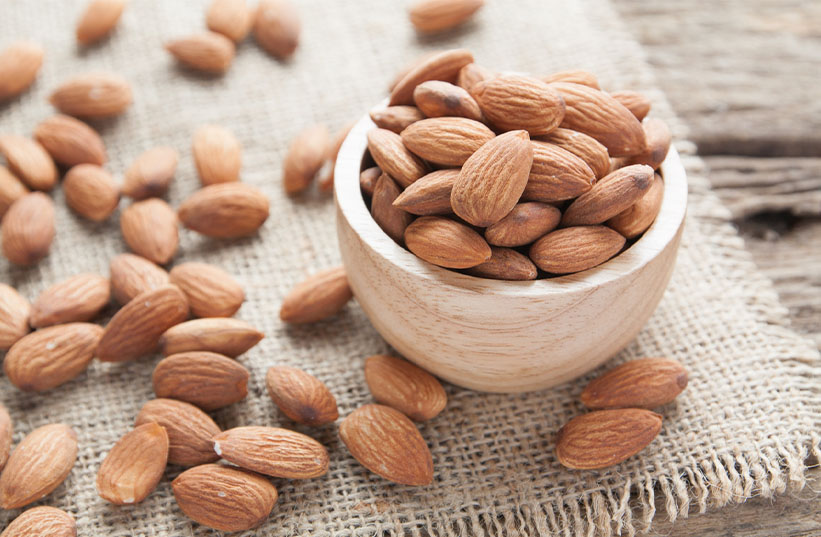We live in an age of “miracle foods," where we proclaim certain foods to have magical properties and that consuming them in your daily life is a cure-all for most health problems. Sadly, this isn't true.
Yet, even though there aren’t “miracle foods” or “superfoods” that by themselves prevent or cure disease, nutritionally dense foods like almonds offer rich nutritional benefits.
In this article you will learn how almonds can improve cholesterol, lower blood pressure, provide important vitamins, and become a key source of fiber in any diet.
Almonds are a staple for any nutrition coach. Let’s explore the topic more in depth below!
Inherent Properties in Food: Healthy Versus Unhealthy Foods
Not all foods are created equal. Foods do have intrinsic properties that make them lean more toward the "healthy" side or the "unhealthy" side. Some of these properties include:
- the food’s nutrient density (how many vitamins and minerals the food packs into one serving)
- the food’s energy density (how many calories the food packs into one serving)
- how satiating they are
- how many phytonutrients they contain
- a handful of other food properties
When we think about where on the healthy versus unhealthy scale foods might lie, there are two good examples we can use that come from the same macronutrient category (fat) to highlight the different inherent properties in food.
First, let’s use Crisco, which falls on the unhealthy side of the scale. Crisco contains around 12 grams of fat per serving, has no protein, no fiber, no phytonutrients, not much satiety, but does contain a small amount of vitamin E (~15% of daily recommended value).
Second, let’s look at almonds, which fall on the healthy side of the scale. Almonds contain some protein, a decent amount of fiber, some phytonutrients, can be satiating, and does provide a good amount of vitamins and minerals.
This picture suggests almonds might be a good source of fat in our diet, and indeed it is! Here are four health benefits that come from including almonds in your diet.
Are Almonds Good For You?
Yes, almonds are great for your health for 4 key reasons:
- They improve cholesterol
- They lower blood pressure
- They are high in vitamins and minerals
- They have a decent amount of fiber
1. Almonds Can Improve Cholesterol
Elevated levels of low-density lipoprotein cholesterol (LDL-C) can increase the risk of developing heart disease. Consuming certain types of fats that are found in almonds (e.g., polyunsaturated fats) has been shown to lower LDL-C and may reduce the risk of heart disease.
One study that examined the effect of almonds on LDL-C found that consuming 20% of a person’s daily calorie intake from almonds lowered LDL-C by roughly 12 mg/dL, which is a meaningful reduction in LDL-C (1).
On the other side of the equation, higher levels of high-density (HDL-C) can lower the risk of developing heart disease. Almonds can improve your HDL-C numbers by raising them slightly. For example, among people with established cardiovascular disease, consuming 10 grams of almonds per day increased HDL by ~12-16% (3-7 mg/dL) (2).
Importantly, nuts, including almonds, may not only lower cholesterol but when included in a generally healthy diet, may reduce the risk of a cardiovascular event. In one of the most well-known studies looking at food and heart disease, a Mediterranean diet that included nuts reduced the risk of having a cardiovascular event by roughly 30% (3).
2. Almonds lower blood pressure
Elevated blood pressure is one of the leading risk factors for heart disease. It is also one of the most modifiable risk factors. Exercise, diet, and managing stress are all very viable ways to reduce blood pressure. While weight loss alone is enough to make a difference, some foods have inherent properties that promote blood pressure reduction.
Almonds have been shown to lower systolic blood pressure, most likely by improving the ability of your body's blood vessels to dilate. Several studies have found that they can lower systolic blood pressure.
For those who follow a DASH diet, nuts are a staple of that nutritional practice. They are heart healthy and can contribute to lower blood pressure.
For example, one study found that consuming 20% of daily calories for 16 weeks lowered blood pressure by ~4-5 mmHg (1). Another study found that consuming 50 grams of almonds daily for four weeks was enough to lower their systolic blood pressure by ~ 10 mmHg (4).
3. Almonds are high in vitamins and minerals
Almonds are good sources of some of the fat-soluble vitamins, specifically vitamin E, which can act as an antioxidant. One serving of almonds contains ~50% of the daily requirement for vitamin E.
They are also rich in magnesium, which may help reduce insulin resistance (5). A serving of almonds, which is around one ounce, contains ~25% of an individual’s daily magnesium requirement. Foods high in whole grain are also a great source of magnesium, if you didn't know!
4. Almonds have a decent amount of fiber
Fiber is essential for the microbiome, feeling full, and overall health. Almonds contain a decent amount of fiber. About 12-15% of an almond’s total weight is fiber, which means that you get a pretty good amount when you consume them for a snack.
Now, almonds should not be your sole source of fiber, as they can be a relatively calorie-heavy snack. You have to eat ~160-200 calories in almonds to get around 3-4 grams of fiber, whereas you get roughly 4 grams of fiber in a 50 calorie serving of broccoli, so make sure you get fiber from multiple sources.
Read also: Foods High in Fiber (Almonds are on the list!)
Conclusion - Almonds Pack a Nutritional Punch!
Almonds are a nutritious fat source and excellent additions to your diet. They pack a pretty heavy micronutrient punch compared to other, more processed fat sources, and may help lower blood pressure and improve cholesterol. They can also be an excellent source of fiber in the diet.
Almonds are portable and generally non-perishable, which makes them good on-the-go snacks. However, almonds can be very calorie-dense, so consuming them in moderation is essential.
Learn more about macronutrients and other nutrition topics by becoming browsing all of our offerings.
















